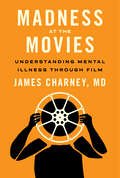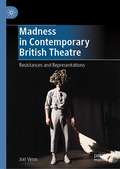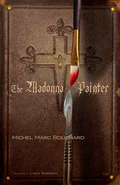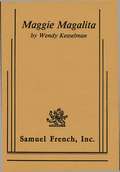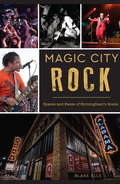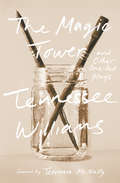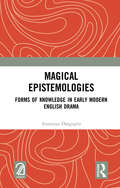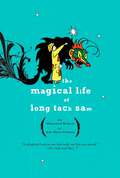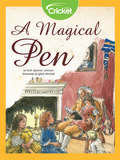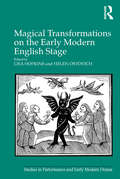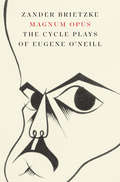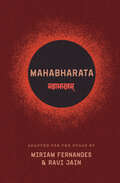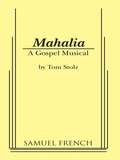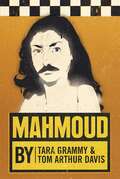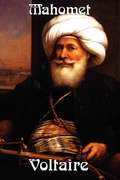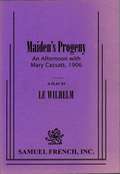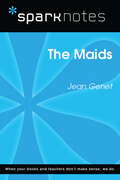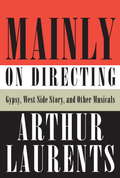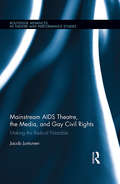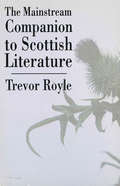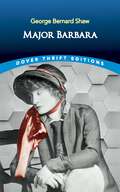- Table View
- List View
Madness at the Movies: Understanding Mental Illness through Film
by James CharneyA unique exploration of how mental illness is portrayed in classic and contemporary films.The study of classic and contemporary films can provide a powerful avenue to understand the experience of mental illness. In Madness at the Movies, James Charney, MD, a practicing psychiatrist and long-time cinephile, examines films that delve deeply into characters' inner worlds, and he analyzes moments that help define their particular mental illness. Based on the highly popular course that Charney taught at Yale University and the American University of Rome, Madness at the Movies introduces readers to films that may be new to them and encourages them to view these films in an entirely new way. Through films such as Psycho, Taxi Driver, Through a Glass Darkly, Night of the Hunter, A Woman Under the Influence, Ordinary People, and As Good As It Gets, Charney covers an array of disorders, including psychosis, paranoia, psychopathy, depression, bipolar disorder, obsessive-compulsive disorder, and anxiety. He examines how these films work to convey the essence of each illness. He also looks at how each film reflects the understanding of mental illness at the time it was released as well as the culture that shaped that understanding.Charney explains how to observe the behaviors displayed by characters in the films, paying close attention to signs of mental illness. He demonstrates that learning to read a film can be as absorbing as watching one. By viewing these films through the lens of mental health, readers can hone their observational skills and learn to assess the accuracy of depictions of mental illness in popular media.
Madness in Contemporary British Theatre: Resistances and Representations
by Jon VennThis book considers the representation of madness in contemporary British theatre, examining the rich relationship between performance and mental health, and questioning how theatre can potentially challenge dominant understandings of mental health. Carefully, it suggests what it means to represent madness in theatre, and the avenues through which such representations can become radical, whereby theatre can act as a site of resistance. Engaging with the heterogeneity of madness, each chapter covers different attributes and logics, including: the constitution and institutional structures of the contemporary asylum; the cultural idioms behind hallucination; the means by which suicide is apprehended and approached; how testimony of the mad person is interpreted and encountered. As a study that interrogates a wide range of British theatre across the past 30 years, and includes a theoretical interrogation of the politics of madness, this is a crucial work for any student or researcher, across disciplines, considering the politics of madness and its relationship to performance.
The Madonna Painter
by Michel Marc Bouchard Linda GaboriauAt the end of the Great War, to protect his village from the Spanish flu epidemic, a priest commissions an Italian painter to decorate the local church with a fresco dedicated to the Virgin Mary. The painter is to choose, among four local women all named Mary, a model for his work. Superstition collides with desire, and lies are unmasked.
Maggie Magalita
by Wendy KesselmanFull length, drama / 3 f (1 teenager), 1m (teenager), various voices / Interior / A 14 year old Hispanic immigrant who lives with her working mother in a New York City studio apartment, Maggie is trying hard to blend into the American lifestyle and she's succeeding. But she's also forgetting the beauty and pride of her heritage. Now that she has an American boyfriend, she wants to have even less to do with her native culture. Grandmother comes from the old country and upsets Maggie's plans: she can't speak English, can't dress American, can't cook American. She just can't blend! When Maggie's American boyfriend comes over for what turns out to be a very non American dinner, Maggie begins to understand something very precious: herself. This winner of the Sharfman Competition at Kennedy Center is perfect for high school productions.
Magic City Rock: Spaces and Faces of Birmingham’s Scene
by Blake EllsBirmingham's rock music scene has thrived on camaraderie and collaboration for decades. With no competitiveness, it has maintained a punk rock ethos while also appealing to a mainstream audience, thanks to DIY clubs and alternative radio support. Once one of the country's most successful AAA radio stations, 107.7 The X and the A&R power of station head Scott Register provided the early radio success that helped break Train, Matchbox Twenty and John Mayer. The same scene produced Jim Bob & the Leisure Suits, the Primitons, the Sugar La Las and Verbena. From local legends like Hotel and Telluride to national sensation St. Paul and the Broken Bones, writer Blake Ells tells the story of the Magic City's indelible stamp on the history of modern rock.
The Magic Tower and Other One-Act Plays
by Terrence Mcnally Tennessee Williams Thomas KeithA wonderful collection of never-before-collected one-acts: "The peak of my virtuosity was in the one- act plays. Some of which are like firecrackers in a rope" (Tennessee Williams). Here are portraits of American life during the Great Depression and after, populated by a hopelessly hopeful chorus girl, a munitions manufacturer ensnared in a love triangle, a rural family that deals "justice" on its children, an overconfident mob dandy, a poor couple who quarrel to vanquish despair, a young "spinster" enthralled by the impulse of rebellion, and, in "The Magic Tower," a passionate artist and his wife whose youth and optimism are not enough to protect their "dream marriage." This new volume gathers some of Williams's most exuberant early work and includes one-acts that he would later expand to powerful full-length dramas: "The Pretty Trap," a cheerful take on The Glass Menagerie, and "Interior: Panic," a stunning precursor to A Streetcar Named Desire. The plays include: * At Liberty * The Magic Tower * Me, Vashya * Curtains for the Gentleman * In Our Profession * Every Twenty Minutes * Honor the Living * The Case of the Crushed Petunias * Moony's Kid Don't Cry * The Dark Room * The Pretty Trap * Interior: Panic * Kingdom of Earth * I Never Get Dressed Till After Dark on Sundays * Some Problems for The Moose Lodge
Magical Epistemologies: Forms of Knowledge in Early Modern English Drama
by Anannya DasguptaThis book began with a simple question: when readers such as us encounter the term magic or figures of magicians in early modern texts, dramatic or otherwise, how do we read them? In the twenty-first century we have recourse to an array of genres and vocabulary from magical realism to fantasy fiction that does not, however, work to read a historical figure like John Dee or a fictional one he inspired in Shakespeare's Prospero. Between longings to transcend human limitation and the actual work of producing, translating, and organizing knowledge, figures such as Dee invite us to re-examine our ways of reading magic only as metaphor. If not metaphor then what else? As we parse the term magic, it reveals a rich context of use that connects various aspects of social, cultural, religious, economic, legal and medical lives of the early moderns. Magic makes its presence felt not only as a forms of knowledge but in methods of knowing in the Renaissance. The arc of dramatists and texts that this book draws between Doctor Faustus, The Tempest, The Alchemist and Comus: A Masque at Ludlow Castle offers a sustained examination of the epistemologies of magic in the context of early modern knowledge formation. Please note: Taylor & Francis does not sell or distribute the Hardback in India, Pakistan, Nepal, Bhutan, Bangladesh and Sri Lanka.
Magical Imaginations
by Genevieve GuentherIn the English Renaissance, poetry was imagined to inspire moral behaviour in its readers, but the efficacy of poetry was also linked to 'conjuration,' the theologically dangerous practice of invoking spirits with words. Magical Imaginations explores how major writers of the period ? including Spenser, Marlowe, and Shakespeare ? negotiated this troubling link between poetry and magic in their attempts to transform readers and audiences with the power of art. Through analyses of texts ranging from sermons and theological treatises to medical tracts and legal documents, Genevieve Guenther sheds new light on magic as a cultural practice in early modern England. She demonstrates that magic was a highly pragmatic, even cynical endeavor infiltrating unexpected spheres ? including Elizabethan taxation policy and Jacobean political philosophy. With this new understanding of early modern magic, and a fresh context for compelling readings of classic literary works, Magical Imaginations reveals the central importance of magic to English literary history.
The Magical Life of Long Tack Sam
by Ann Marie FlemingA full-color graphic memoir inspired by the award-winning documentary-and the life and mystery of China's greatest magician. Who was Long Tack Sam? He was born in 1885. He ran away from Shangdung Province to join the circus. He was an acrobat. A magician. A comic. An impresario. A restaurateur. A theater owner. A world traveler. An East-West ambassador. A mentor to Orson Welles. He was considered the greatest act in the history of vaudeville. In this gorgeous graphic memoir, his great-granddaughter, the artist and filmmaker Ann Marie Fleming, resurrects his fascinating life for the rest of the world. It's an exhilarating testament to a forgotten man. And every picture is true.Watch a QuickTime trailer for this book.
A Magical Pen
by Ruth Spencer JohnsonDid you know that Congress signed the Declaration of Independence on the Fourth of July? In this short play, learn more about the Declaration as Thomas Jefferson himself tells his grandchildren the story of its creation.
Magical Transformations on the Early Modern English Stage (Studies in Performance and Early Modern Drama)
by Lisa Hopkins Helen OstovichMagical Transformations on the Early Modern Stage furthers the debate about the cultural work performed by representations of magic on the early modern English stage. It considers the ways in which performances of magic reflect and feed into a sense of national identity, both in the form of magic contests and in its recurrent linkage to national defence; the extent to which magic can trope other concerns, and what these might be; and how magic is staged and what the representational strategies and techniques might mean. The essays range widely over both canonical plays-Macbeth, The Tempest, The Winter’s Tale, The Merry Wives of Windsor, Doctor Faustus, Bartholomew Fair-and notably less canonical ones such as The Birth of Merlin, Fedele and Fortunio, The Merry Devil of Edmonton, The Devil is an Ass, The Late Lancashire Witches and The Witch of Edmonton, putting the two groups into dialogue with each other and also exploring ways in which they can be profitably related to contemporary cases or accusations of witchcraft. Attending to the representational strategies and self-conscious intertextuality of the plays as well as to their treatment of their subject matter, the essays reveal the plays they discuss as actively intervening in contemporary debates about witchcraft and magic in ways which themselves effect transformation rather than simply discussing it. At the heart of all the essays lies an interest in the transformative power of magic, but collectively they show that the idea of transformation applies not only to the objects or even to the subjects of magic, but that the plays themselves can be seen as working to bring about change in the ways that they challenge contemporary assumptions and stereotypes.
Magnata Sexual - A Cuidadora
by N. KundaliniMagnata Sexual A Cuidadora por N. Kundalini O Relatório da Cuidadora A cuidadora de Joanna conta sua experiência Após a morte de Joanna, seu livro foi publicado como ela desejava. Isso incentivou outros a divulgar suas histórias.
Magnum Opus: The Cycle Plays of Eugene O'Neill
by Zander BrietzkeAn original and provocative analysis of Eugene O'Neill's unfinished cycle play project From 1935 to 1939, Eugene O&’Neill worked on a series of plays that would trace the history of an American family through several generations. He completed just two of the proposed eleven plays—A Touch of the Poet and More Stately Mansions—which Zander Brietzke argues represent the core of the entire cycle. Combining archival research, literary analysis, and theatrical imagination, Magnum Opus invites an audience to see this unusual and exciting epic as a historical drama of our time.
Mahabharata
by Ravi Jain Miriam FernandesA contemporary dramatic take on a 4,000-year-old Sanskrit epic that is foundational to Indian culture. Why Not Theatre’s large-scale, once-in-a-generation retelling of Mahabharata brings together a cast of performers entirely from the South Asian diaspora, blending cultures and art forms in a spectacular production at the Shaw Festival and the Barbican Theatre in London. Over two parts (Karma and Dharma) and a communal meal (Khana), this translation and adaptation of Mahabharata spans generations and takes audiences into the hearts and minds of some of the most complex and enduring characters ever created. With warring families and devious revenge plots, Mahabharata tells the story of an ancient feud with philosophical and spiritual questions that are no less urgent today. In times of division, how do we find wholeness? Are we destined to repeat the mistakes of our ancestors? And how can we build a new world when we have nearly destroyed this one? Contains the full text of the play along with materials opening up the behind-the-scenes world of the production, including interviews with the creators, background and context about the source material, production photographs, a Mahabharata family tree, and glossary."Ravi Jain and Miriam Fernandes’s contemporary take on the Mahabharata is one of the most beautiful emotional journeys I have had the privilege to witness. It is inspiring, mind broadening, and speaks to all the senses. It even brings you back to the origins of theatre itself, when people would gather in the quarries around a bonfire to tell stories. With their tasteful use of technology, dance, and opera, the 4,000-year-old Sanskrit poem comes to life and feels more universal than ever. A captivating theatre experience, from the first flame to the last pixel." – Robert Lepage"In their stunning rendition of the great Indian epic Mahabharata, Ravi Jain and Miriam Fernandes brilliantly reverse the whole concept of what Bertolt Brecht famously advised theatre directors: to make the familiar, unfamiliar. Jain and Fernandes have turned the unfamiliar into the familiar. The 4,000-year-old saga most Indians grew up with is made accessible to a contemporary audience the world over. No mean feat. ‘The play, true to its source, crosses all boundaries of culture, class, and geography. Its timeless storytelling and evocative stage design is transformed into a saga for the world, with its fundamental emotions of human nature – power, hate, jealousy, greed, and lust. To be gob-smacked by this innovation would be an understatement. Immerse yourself in this take on the Mahabharata and travel with it in time into the past, present, and future of humanity." – Deepa Mehta
Mahadevbhai, 1892-1942, and Insomnia
by Ramu Ramanathan Ninaz KhodaijiMAHADEVBHAI (1892 - 1942) is a one-person play, which attempts to remind us of the times that were, and their devotion to truth. INSOMNIA consists of 4 Monologues by Ninaz Khodaiji.
Mahalia
by Tom StolzCharacters: 1 male, 2 female Simple set . Including music by various gospel composers as well as hymns and spirituals made famous by Mahalia Jackson, this is a joyous celebration of the life and music of the world's greatest gospel singer: a humble, deeply religious woman whose expressive, full throated voice carried her from a three room shanty in New Orleans to appearances before presidents and royalty. The joy and inspiration of her heartfelt songs provide a counterpoint to the urgent messages delivered by her friend, Martin Luther King. Standing at his side, Mahalia Jackson became the musical voice of the civil rights movement. Mahalia uses simple staging, only three actors, and piano and organ accompaniments to showcase 22 great gospel numbers in a moving, often humorous musical tribute. . "A first rate tour of the throbbing world of gospel music." Minneapolis Star Tribune. . "Superb in every way." Christian Chronicle. . "A rare joy, a balm for the spirit. This is not a night in the theatre but a soul cleansing experience. Don't miss it!" Sun Newspapers.
Mahmoud
by Tara Grammy Tom Arthur DavisMahmoud is an exuberant, if overwhelmingly passionate, Iranian engineer-cum-taxi driver who relishes the chance to regale his passengers with his love of Persian culture. Emanuelos, a fabulously gay Spanish perfume salesman, can talk a mile-a-minute about his boyfriend, Behnam. And then there's Tara, an awkwardly charming Iranian Canadian preteen who just wants to be "normal," whatever that means. When the three strangers find themselves crossing paths in the busy streets of Toronto, their experiences with racism, sexism, homophobia, homesickness, and everything in between become intertwined in unexpected ways.
Mahomet
by VoltaireThis powerful work was read by Voltaire to Frederick of Prussia in 1740, to the king's great delight. The play was withdrawn after the fourth representation, under pressure of Church authorities who professed to see in it a bloody satire against the Christian religion. Almost three hundred years later critics are still unclear if this play is a rebuke of Islam or of Christianity or, perhaps, both. Wilder Publications is a green publisher. All of our books are printed to order. This reduces waste and helps us keep prices low while greatly reducing our impact on the environment.
Maiden's Progeny
by Le WilhelmFull length, drama / 1m, 2f / Interior / Frederick M Winship (UPI) writes regarding MAIDEN's PROGENY, "It was high time that someone wrote a play about Mary Cassatt, the only American member of the original Impressionist coterie of artists. Le Wilhelm, has met the challenge with flying colors with MAIDEN's PROGENY." This intellectually entertaining drama takes the audience to Cassatt's chateau outside Paris on a spring afternoon when Wynford Johnston comes calling uninvited. What follows is living discussion, of two very head strong individuals, that ultimately results in an understanding and growth in both characters. Never falling into the category of a lecture, this play provides insight and understanding of the art and times at the dawning of the 20th century.
The Maids (SparkNotes Literature Guide Series)
by SparkNotesThe Maids (SparkNotes Literature Guide) by Jean Genet Making the reading experience fun! Created by Harvard students for students everywhere, SparkNotes is a new breed of study guide: smarter, better, faster. Geared to what today's students need to know, SparkNotes provides: *Chapter-by-chapter analysis *Explanations of key themes, motifs, and symbols *A review quiz and essay topicsLively and accessible, these guides are perfect for late-night studying and writing papers
Musical / 9m, 6f / Mail piles up for months while Alex, an unpublished author, slips away to escape anxieties over his artistic and romantic problems. When he returns to open the accumulation, each letter springs to life. Alex's girl friend, his family and his best friend-- even those sending bills and hilarious junk mail-- fill the stage with song and dance. This is a wild and wacky musical by the authors of 3 Guys Naked from the Waist Down.
Mainly on Directing: Gypsy, West Side Story, and Other Musicals
by Arthur LaurentsFrom playwright, screenwriter, and director Laurents comes a mesmerizing book about theater, art and the artist, the insider and the outsider--and the making of two of the greatest musicals of the American stage: "Gypsy" and "West Side Story."
Mainstream AIDS Theatre, the Media, and Gay Civil Rights: Making the Radical Palatable (Routledge Advances in Theatre & Performance Studies)
by Jacob JuntunenThis book demonstrates the political potential of mainstream theatre in the US at the end of the twentieth century, tracing ideological change over time in the reception of US mainstream plays taking HIV/AIDS as their topic from 1985 to 2000. This is the first study to combine the topics of the politics of performance, LGBT theatre, and mainstream theatre’s political potential, a juxtaposition that shows how radical ideas become mainstream, that is, how the dominant ideology changes. Using materialist semiotics and extensive archival research, Juntunen delineates the cultural history of four pivotal productions from that period—Larry Kramer’s The Normal Heart (1985), Tony Kushner’s Angels in America (1992), Jonathan Larson’s Rent (1996), and Moises Kaufman’s The Laramie Project (2000). Examining the connection between AIDS, mainstream theatre, and the media reveals key systems at work in ideological change over time during a deadly epidemic whose effects changed the nation forever. Employing media theory alongside nationalism studies and utilizing dozens of reviews for each case study, the volume demonstrates that reviews are valuable evidence of how a production was hailed by society’s ideological gatekeepers. Mixing this new use of reviews alongside textual analysis and material study—such as the theaters’ locations, architectures, merchandise, program notes, and advertising—creates an uncommonly rich description of these productions and their ideological effects. This book will be of interest to scholars and students of theatre, politics, media studies, queer theory, and US history, and to those with an interest in gay civil rights, one of the most successful social movements of the late twentieth century.
The Mainstream Companion to Scottish Literature
by Trevor RoyleThe Mainstream Companion to Scottish Literature is the most comprehensive reference guide to Scotland's literature, covering a period from the earliest times to the early 1990s. It includes over 600 essays on the lives and works of the principal poets, novelists, dramatists critics and men and women of letters who have written in English, Scots or Gaelic. Thus, as well as such major writers as Robert Henryson, William Dunbar, Gavin Douglas, Allan Ramsay, Robert Fergusson, Robert Burns, Walter Scott, Robert Louis Stevenson and Hugh MacDiarmid, the Companion also lists many minor writers whose work might otherwise have been overlooked in any survey of Scottish literature.Also included here are entries on the lives of other more peripheral writers such as historians, philosophers, diarists and divines whose work has made a contribution to Scottish letters.Other essays range over such general subjects as the principal work of major writers, literary movements, historical events, the world of printing and publishing, folklore, journalism, drama and Gaelic. A feature of the book is the inclusion of the bibliography of each writer and reference to the major critical works. This comprehensive guide is an essential tool for the serious student of Scottish literature as well as being an ideal guide and companion for the general reader.
Major Barbara (Dover Thrift Editions: Plays)
by George Bernard ShawFabian socialist and ardent proselytizer, George Bernard Shaw viewed his role as a playwright as far more than that of an entertainer. His audiences heard fully articulated sermons on moral and economic issues, a potentially dry theatrical experience enlivened by Shaw's genius for creating vital characters and scintillating dialogue. Major Barbara offers a sparkling example of its author's unique gift for presenting social theories in an engaging format.The eponymous heroine, an officer in the Salvation Army, is the daughter of Andrew Undershaft, a wealthy armaments manufacturer. When the Army accepts donations from Undershaft and a whiskey distiller, whose money Barbara regards as tainted, she resigns in disgust, but eventually sees the truth of her father's reasoning that social iniquity derives from poverty; it is only through accumulating wealth and power that people can help each other.
